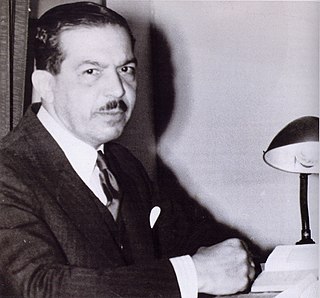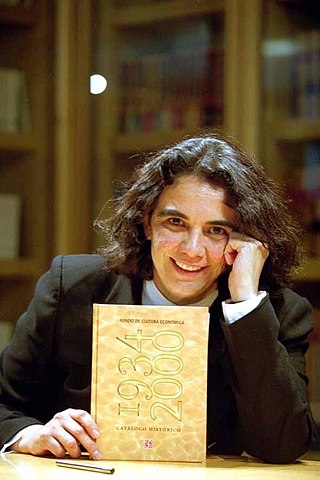Related Research Articles

Alfonso Reyes Ochoa was a Mexican writer, philosopher and diplomat. He was nominated for the Nobel Prize in Literature five times and has been acclaimed as one of the greatest authors in Spanish language. He served as ambassador of Mexico to Argentina and Brazil.

The Científicos were a circle of technocratic advisors to President of Mexico Porfirio Díaz. Steeped in the positivist "scientific politics", they functioned as part of his program of modernization at the start of the 20th century.

Jorge Ibargüengoitia Antillón was a Mexican novelist and playwright who achieved great popular and critical success with his satires, three of which have appeared in English: The Dead Girls, Two Crimes, and The Lightning of August. His plays include Susana y los Jóvenes and Ante varias esfinges, both dating from the 1950s. His work also includes short stories and chronicles and is currently considered one of the most influential writers in Latin American literature.
Antonio Alatorre Vergara was a Mexican writer, philologist and translator, famous due to his influential academic essays about Spanish literature, and because of his book Los 1001 años de la lengua española.

Alí Chumacero Lora was a Mexican poet, translator, literary critic and editor. He was a member of the Mexican Academy of Language.
Fondo de Cultura Económica is a Spanish language, non-profit publishing group, partly funded by the Mexican government. It is based in Mexico but it has subsidiaries throughout the Spanish-speaking world.
Margo Glantz Shapiro is a Mexican writer, essayist, critic and academic. She has been a member of the Academia Mexicana de la Lengua since 1995. She is a recipient of the FIL Award.

Pedro Henríquez Ureña was a Dominican essayist, philosopher, humanist, philologist and literary critic.

Juan David García Bacca was a Spanish-Venezuelan philosopher and university professor. He was born in Pamplona on June 26, 1901, and passed away on August 5, 1992, in Quito, Ecuador. Bacca began his education under the Claretians and was ordained as a priest in 1925. He continued his studies at the University of Munich, the University of Zurich, and the University of Paris. However, during the 1930s, he left the Church and pursued philosophy at the University of Barcelona. In 1936 after criticizing Francisco Franco, Bacca was forced to live in exile. He first traveled to Ecuador where he taught at the Central University of Ecuador (1939-1942). While in Ecuador he became close friends with a writer named Alfredo Pareja Diezcanseco. He then went to Mexico where he taught at UNAM from 1942 to 1946. He eventually established himself in Venezuela in 1946 and was granted citizenship in 1952. Bacca was a professor at the Central University of Venezuela until his retirement in 1971. He was recognized for his life's work and was awarded the National Prize for Literature in 1978.

Ricardo Ernesto Montes i Bradley, poet, essayist, art historian, and literary critic and diplomat born on June 9, 1905, in Rosario, Argentina. He was Honorary Consul of México in Rosario, professor of Fine Arts, publisher, columnist and contributor in newspapers and literary magazines in Latin America. R-E Montes i Bradley held Doctorates in the Law, Diplomacy, History and International Law. He was an active member of the International Institute of Ibero-American Literature and the International Association of Critics; Correspondent Member of the National Academy of Arts and Literature of Cuba and of the National Academy of History and Geography of Mexico; Honorary Member of the Mexican Academy of Genealogy and Heraldry ; member of the Sociedad Argentina de Escritores (SADE); a member of the Círculo de la Prensa and the Colegio de Abogados de la Ciudad de Rosario; co-founded the Escuela de Bellas Artes de Rosario; member of the Asociación de Críticos de México. As publisher, he was responsible for the Boletín de Cultura Intelectual, which he also directed; the art magazines Revista Paraná and Cuadernos del Litoral were also the result of his commitment to journalism in the arts. The last two publications were dedicated to promote the works of local artist, writers, poets in the region known as Paraná, Rosario de Santa Fe and vicinity.

Alberto Blanco is a Mexican poet. Born in Mexico City, he spent his childhood and adolescence in that city, and he studied chemistry at the Universidad Iberoamericana and philosophy at the Universidad Nacional Autónoma de México. For two years, he pursued a master's degree in Asian Studies, specializing in China, at El Colegio de México.1 Blanco was first published in a journal in 1970. He was co-editor and designer of the poetry journal El Zaguan (1975–1977), and a grant recipient of the Centro Mexicano de Escritores, el Instituto Nacional de Bellas Artes, and the Fondo Nacional para la Cultura y las Artes. In 1991 he received a grant from the Fulbright Program as a poet-in-residence at the University of California, Irvine; and, in 1992, he was awarded a grant from the Rockefeller Foundation. He was admitted into the Sistema Nacional de Creadores in 1994, for which he has also been a juror. In 2001 he received the Octavio Paz Grant for Poetry, and in 2008, he was awarded a grant from the Guggenheim Foundation. He remains a member of the Sistema Nacional de Creadores.

Ida Vitale is a Uruguayan poet, translator, essayist, lecturer and literary critic.

Roxana del Consuelo Sáizar Guerrero, is an editor and publisher, former CEO of Fondo de Cultura Económica (2002-2009), President of the National Council for Culture and the Arts (CONACULTA) (2009-2012) and President of the Regional Center for the Promotion of Books in Latin America and the Caribbean (Cerlalc) (2010-2012). She began her career working in the family printing business at her home state of Nayarit. After graduating with a degree in Communications in 1983, she began to manage editorial departments and publishing houses until 2002, when she was appointed director of government-owned Fondo de Cultura Económica, which is considered the largest publishing house in Latin America. She restructured the organization and started its electronic publishing program. In 2009, she was named President of CONACULTA, an institution devoted to promoting Mexican culture both domestically and abroad, that has since been transformed into the National Ministry of Culture.
Carlos Marichal is a Mexican economic historian who currently works at El Colegio de México, where he has taught since 1989. He has done research and published widely on the economic and financial history of Latin America.
José Luis Martínez Rodríguez was a Mexican academic, diplomat, essayist, historian, bibliographer and editor. He was the director of the Fondo de Cultura Económica from 1977 to 1982 and professor of literature with the Faculty of Philosophy and Letters at the National Autonomous University of Mexico.
Blanca López de Mariscal or Blanca Guadalupe López Morales is a Professor emeritus and researcher in literature at Tecnológico de Monterrey, Campus Monterrey, México.
Marcela Yolanda Del Río y Reyes is an intellectual, professor, journalist, diplomat and writer. Her works cover national and global issues.
María Luisa Mendoza, also known as La China Mendoza, was a Mexican journalist, novelist and politician. She served as a federal delegate from the state of Guanajuato to the 53rd Mexican legislature.

Aline Pettersson is a Mexican novelist and poet. Her novels deal with the themes of loneliness, heartbreak, isolation and the passage of time that razes all.

Guadalupe Dueñas was a 20th-century Mexican short story writer and essayist.
References
- ↑ Instituto Nacional de Bellas Artes: Alfonso Reyes International Prize
- ↑ "Mexican Writer Fernando del Paso Wins Alfonso Reyes Prize". Latin American Herald Tribune. Archived from the original on December 31, 2013. Retrieved January 1, 2014.
- ↑ Otorgan el Premio Alfonso Reyes 2019 a Herbert S. Klein El Universal 13 Feb 2020 (in Spanish)